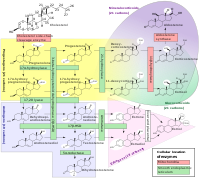Ionotropic
GABAA Tooltip γ-Aminobutyric acid A receptor
Positive modulators (abridged; see here for a full list): α-EMTBL Alcohols (e.g., drinking alcohol , 2M2B )Anabolic steroids Avermectins (e.g., ivermectin )Barbiturates (e.g., phenobarbital )Benzodiazepines (e.g., diazepam )Bromide compounds (e.g., potassium bromide )Carbamates (e.g., meprobamate )Carbamazepine Chloralose Chlormezanone Clomethiazole Dihydroergolines (e.g., ergoloid (dihydroergotoxine) )Etazepine Etifoxine Fenamates (e.g., mefenamic acid )Flavonoids (e.g., apigenin , hispidulin )Fluoxetine Flupirtine Imidazoles (e.g., etomidate )Kava constituents (e.g., kavain )Lanthanum Loreclezole Monastrol Neuroactive steroids (e.g., allopregnanolone , cholesterol , THDOC )Niacin Niacinamide Nonbenzodiazepines (e.g., β-carbolines (e.g., abecarnil ), cyclopyrrolones (e.g., zopiclone ), imidazopyridines (e.g., zolpidem ), pyrazolopyrimidines (e.g., zaleplon ))Norfluoxetine Petrichloral Phenols (e.g., propofol )Phenytoin Piperidinediones (e.g., glutethimide )Propanidid Pyrazolopyridines (e.g., etazolate )Quinazolinones (e.g., methaqualone )Retigabine (ezogabine) ROD-188 Skullcap constituents (e.g., baicalin )Stiripentol Sulfonylalkanes (e.g., sulfonmethane (sulfonal) )Topiramate Valerian constituents (e.g., valerenic acid )Volatiles /gases (e.g., chloral hydrate , chloroform , diethyl ether , paraldehyde , sevoflurane )Negative modulators: 1,3M1B 3M2B 11-Ketoprogesterone 17-Phenylandrostenol α3IA α5IA (LS-193,268) β-CCB β-CCE β-CCM β-CCP β-EMGBL Anabolic steroids Amiloride Anisatin β-Lactams (e.g., penicillins , cephalosporins , carbapenems )Basmisanil Bemegride Bicyclic phosphates (TBPS , TBPO , IPTBO )BIDN Bilobalide Bupropion CHEB Chlorophenylsilatrane Cicutoxin Cloflubicyne Cyclothiazide DHEA DHEA-S Dieldrin (+)-DMBB DMCM DMPC EBOB Etbicyphat FG-7142 (ZK-31906) Fiproles (e.g., fipronil )Flavonoids (e.g., amentoflavone , oroxylin A )Flumazenil Fluoroquinolones (e.g., ciprofloxacin )Flurothyl Furosemide Golexanolone Iomazenil (123 I) IPTBO Isopregnanolone (sepranolone) L-655,708 Laudanosine Lindane MaxiPost Morphine Morphine-3-glucuronide MRK-016 Naloxone Naltrexone Nicardipine Nonsteroidal antiandrogens (e.g., apalutamide , bicalutamide , enzalutamide , flutamide , nilutamide )Oenanthotoxin Pentylenetetrazol (pentetrazol) Phenylsilatrane Picrotoxin (i.e., picrotin , picrotoxinin and dihydropicrotoxinin )Pregnenolone sulfate Propybicyphat PWZ-029 Radequinil Ro 15-4513 Ro 19-4603 RO4882224 RO4938581 Sarmazenil SCS Suritozole TB-21007 TBOB TBPS TCS-1105 Terbequinil TETS Thujone U-93631 Zinc ZK-93426 GABAA -ρ Tooltip γ-Aminobutyric acid A-rho receptor
Metabotropic
GABAB Tooltip γ-Aminobutyric acid B receptor
Receptor (ligands )
GlyR Tooltip Glycine receptor
Positive modulators: Alcohols (e.g., brometone , chlorobutanol (chloretone) , ethanol (alcohol) , tert -butanol (2M2P)tribromoethanol , trichloroethanol , trifluoroethanol )Alkylbenzene sulfonate Anandamide Barbiturates (e.g., pentobarbital , sodium thiopental )Chlormethiazole D12-116 Dihydropyridines (e.g., nicardipine )Etomidate Ginseng constituents (e.g., ginsenosides (e.g., ginsenoside-Rf ))Glutamic acid (glutamate) Ivermectin Ketamine Neuroactive steroids (e.g., alfaxolone , pregnenolone (eltanolone) , pregnenolone acetate , minaxolone , ORG-20599 )Nitrous oxide Penicillin G Propofol Tamoxifen Tetrahydrocannabinol Triclofos Tropeines (e.g., atropine , bemesetron , cocaine , LY-278584 , tropisetron , zatosetron )Volatiles /gases (e.g., chloral hydrate , chloroform , desflurane , diethyl ether (ether) , enflurane , halothane , isoflurane , methoxyflurane , sevoflurane , toluene , trichloroethane (methyl chloroform) , trichloroethylene )Xenon Zinc Antagonists: 2-Aminostrychnine 2-Nitrostrychnine 4-Phenyl-4-formyl-N-methylpiperidine αEMBTL Bicuculline Brucine Cacotheline Caffeine Colchicine Colubrine Cyanotriphenylborate Dendrobine Diaboline Endocannabinoids (e.g., 2-AG , anandamide (AEA) )Gaboxadol (THIP) Gelsemine iso-THAZ Isobutyric acid Isonipecotic acid Isostrychnine Laudanosine N-Methylbicuculline N-Methylstrychnine N,N-Dimethylmuscimol Nipecotic acid Pitrazepin Pseudostrychnine Quinolines (e.g., 4-hydroxyquinoline , 4-hydroxyquinoline-3-carboxylic acid , 5,7-CIQA , 7-CIQ , 7-TFQ , 7-TFQA )RU-5135 Sinomenine Strychnine Thiocolchicoside Tutin Negative modulators: Amiloride Benzodiazepines (e.g., bromazepam , clonazepam , diazepam , flunitrazepam , flurazepam )Corymine Cyanotriphenylborate Daidzein Dihydropyridines (e.g., nicardipine , nifedipine , nitrendipine )Furosemide Genistein Ginkgo constituents (e.g., bilobalide , ginkgolides (e.g., ginkgolide A , ginkgolide B , ginkgolide C , ginkgolide J , ginkgolide M ))Imipramine NBQX Neuroactive steroids (e.g., 3α-androsterone sulfate , 3β-androsterone sulfate , deoxycorticosterone , DHEA sulfate , pregnenolone sulfate , progesterone )Opioids (e.g., codeine , dextromethorphan , dextrorphan , levomethadone , levorphanol , morphine , oripavine , pethidine , thebaine )Picrotoxin (i.e., picrotin and picrotoxinin )PMBA Riluzole Tropeines (e.g., bemesetron , LY-278584 , tropisetron , zatosetron )Verapamil Zinc NMDAR Tooltip N-Methyl-D-aspartate receptor
Transporter (blockers )
GlyT1 Tooltip Glycine transporter 1 GlyT2 Tooltip Glycine transporter 2
AMPAR Tooltip α-Amino-3-hydroxy-5-methyl-4-isoxazolepropionic acid receptor KAR Tooltip Kainate receptor NMDAR Tooltip N-Methyl-D-aspartate receptor
TRPA
Activators
4-Hydroxynonenal 4-Oxo-2-nonenal 4,5-EET 12S-HpETE 15-Deoxy-Δ12,14 -prostaglandin J2 α-Sanshool (ginger , Sichuan and melegueta peppers )Acrolein Allicin (garlic )Allyl isothiocyanate (mustard , radish , horseradish , wasabi )AM404 ASP-7663 Bradykinin Cannabichromene (cannabis )Cannabidiol (cannabis )Cannabigerol (cannabis )Cinnamaldehyde (cinnamon )CR gas (dibenzoxazepine; DBO) CS gas (2-chlorobenzal malononitrile) Cuminaldehyde (cumin )Curcumin (turmeric )Dehydroligustilide (celery )Diallyl disulfide Dicentrine (Lindera Farnesyl thiosalicylic acid Formalin Gingerols (ginger )Hepoxilin A3 Hepoxilin B3 Hydrogen peroxide Icilin Isothiocyanate JT-010 Ligustilide (celery , Angelica acutiloba Linalool (Sichuan pepper , thyme )Methylglyoxal Methyl salicylate (wintergreen )N-Methylmaleimide Nicotine (tobacco )Oleocanthal (olive oil )Paclitaxel (Pacific yew )Paracetamol (acetaminophen) PF-4840154 Phenacyl chloride Polygodial (Dorrigo pepper )Shogaols (ginger , Sichuan and melegueta peppers )Tear gases Tetrahydrocannabinol (cannabis )Tetrahydrocannabiorcol Thiopropanal S-oxide (onion )Umbellulone (Umbellularia californica )WIN 55,212-2 Blockers
TRPC
TRPM
TRPML
TRPP
TRPV
Activators
2-APB 5',6'-EET 9-HODE 9-oxoODE 12S-HETE 12S-HpETE 13-HODE 13-oxoODE 20-HETE α-Sanshool (ginger , Sichuan and melegueta peppers )Allicin (garlic )AM404 Anandamide Bisandrographolide (Andrographis paniculata Camphor (camphor laurel , rosemary , camphorweed , African blue basil , camphor basil )Cannabidiol (cannabis )Cannabidivarin (cannabis )Capsaicin (chili pepper )Carvacrol (oregano , thyme , pepperwort , wild bergamot , others)DHEA Diacyl glycerol Dihydrocapsaicin (chili pepper )Estradiol Eugenol (basil , clove )Evodiamine (Euodia ruticarpa Gingerols (ginger )GSK1016790A Heat Hepoxilin A3 Hepoxilin B3 Homocapsaicin (chili pepper )Homodihydrocapsaicin (chili pepper )Incensole (incense )Lysophosphatidic acid Low pH (acidic conditions)
Menthol (mint )N-Arachidonoyl dopamine N-Oleoyldopamine N-Oleoylethanolamide Nonivamide (PAVA) (PAVA spray )Nordihydrocapsaicin (chili pepper )Paclitaxel (Pacific yew )Paracetamol (acetaminophen) Phenylacetylrinvanil Phorbol esters (e.g., 4α-PDD )Piperine (black pepper , long pepper )Polygodial (Dorrigo pepper )Probenecid Protons RhTx Rutamarin (Ruta graveolens Resiniferatoxin (RTX) (Euphorbia resinifera /pooissonii Shogaols (ginger , Sichuan and melegueta peppers )Tetrahydrocannabivarin (cannabis )Thymol (thyme , oregano )Tinyatoxin (Euphorbia resinifera /pooissonii Tramadol Vanillin (vanilla )Zucapsaicin Blockers


